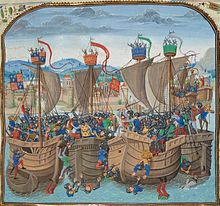Melee


A melee (/ˈmeɪleɪ/ or /ˈmɛleɪ/, French: mêlée, (French: [mɛle])) or pell-mell is disorganized hand-to-hand combat in battles fought at abnormally close range with little central control once it starts.[1] In military aviation, a melee has been defined as "an air battle in which several aircraft, both friend and foe, are confusingly intermingled".[2]
History of the term
[edit]In the 1579 translation of Plutarch's Lives of the noble Grecians and Romanes, Sir Thomas North uses the term 'pelmel' to refer to a disorganized retreat.[3] The phrase was later used in its current spelling in Shakespeare's Richard III, 1594:
"March on, ioine brauelie, let vs to it pell mell, / If not to heauen then hand in hand to hell."
The phrase comes from the French expression pêle-mêle, a rhyme based on the old French mesler, meaning to mix or mingle.[3][4]
The French term melee was first used in English in c. 1640 (also derived from the old French mesler,[5] but the Old French stem survives in medley and meddle).[1]
Lord Nelson described his tactics for the Battle of Trafalgar as inducing a "pell mell battle" focused on engagements between individual ships where the superior morale and skill of the Royal Navy would prevail.[6]
Usage in sport
[edit]In Australian Rules Football, the term "melee" is used by the Australian Football League, sports commentators and journalists as a polite term for a brawl or fighting during a football match,[7] where football players physically attack. Melees often start as verbal disagreements between a small number players from the opposing teams, but can quickly escalate into many players from both teams joining in with this physical scuffle.[8]
See also
[edit]Notes
[edit]- ^ a b OED 2015.
- ^ Kumar, DeRemer & Marshall 2004, p. 462.
- ^ a b "'Pell-mell' - the meaning and origin of this phrase".
- ^ "Pell-mell". 26 July 2021.
- ^ "Melee". 29 November 2021.
- ^ Fremont-Barnes 2005, p. 38.
- ^ "Laws of Australian Rules Football, 2019 - page 8" (PDF). Australian Football League. 4 December 2019. Retrieved 2 April 2022.
- ^ AFL Melees: Pies, Cats, Port, Dons, Demons and Tigers, retrieved 2022-04-02
References
[edit]- Fremont-Barnes, Gregory (2005), Trafalgar 1805: Nelson's Crowning Victory, Osprey Publishing, p. 38 38, ISBN 978-1-84176-892-2
- Kumar, Bharat; DeRemer, Dale; Marshall, Douglas (2004), An Illustrated Dictionary of Aviation, McGraw Hill Professional, p. 462, ISBN 978-0-07-178260-9
- "mêlée n.", Oxford English Dictionary (online ed.), Oxford University Press, March 2015
